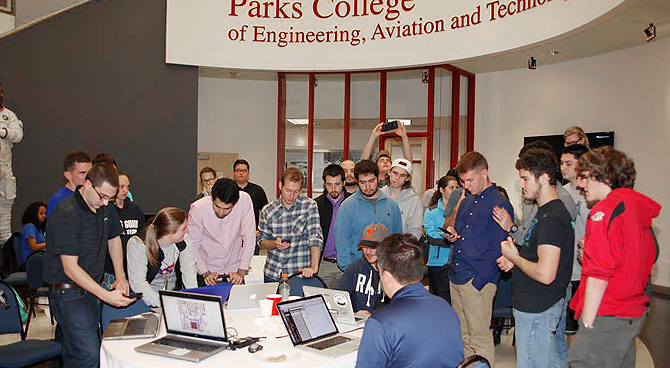‘Space is Hard’: Failed Satellite Launch Offers Students Real-World Lesson
Students at Saint Louis University got a real-world lesson Tuesday night after a rocket carrying a small satellite built by SLU's Space Systems Research Laboratory failed to reach orbit after being launched from a naval base in Kauai, Hawaii.
Known as "Argus," the SLU satellite was a 4-by-8-inch, 6-pound CubeSat designed to help create more efficient spacecraft in the future. The Institute for Defense and Space Electronics at Vanderbilt University provided the science instruments, and would have used the data to improve their predictions of how long electronics will last in the harsh radiation environment of space.
"Space is hard," said aerospace engineering professor Michael Swartwout, Ph.D., who directs the laboratory. "We try to teach our students that you can't be afraid of failure or avoid trying even in the odds are stacked against you. It's important for us to encourage perseverance and a sense of daring in our graduates."
SLU senior Mary Distler was among the students who gathered in the rotunda of McDonnell Douglas Hall - home to Parks College of Engineering, Aviation and Technology - to watch the launch via a live stream. Distler is the lab's lead systems engineer.
"When the rocket failed, it was defeating," she said. "Dr. Swartwout is always telling us that you have to have thick skin to work in this field. You can work on a project for years and see it literally go up in flames. Something like this also teaches you how to learn from the smaller victories and to grow together as a team."
Despite Tuesday's set-back, all is not lost for the SLU team. Two other ongoing missions are in development. Further, the students in the lab are eager to build an Argus 2 and are hoping to find another launch window in the near future.
Space is hard. We try to teach our students that you can't be afraid of failure or avoid trying even in the odds are stacked against you. It's important for us to encourage perseverance and a sense of daring in our graduates.
- Michael Swartwout, Ph.D.
For Distler, a native of Fort Wayne, Indiana, who is set to graduate in May, the experience of working on the project only reinforces what drew her to Saint Louis University in the first place.
"I came here because I knew there would be a lot of opportunities for hands-on experience," she said. "We're being given this great skillset we can bring into the industry. It's encouraging to see that there many opportunities in front of us, and this is just one step along the way."
SLU's Space Systems Research Laboratory has been actively working since 2009. Members of the lab have gone on to work for Boeing and other space contractors, as well as Space X, the commercial space flight firm.
Currently, there are about 30 students involved in the lab representing an array of majors, include aerospace engineering, electrical and computer engineering, and computer science. Swartwout noted that the lab was intentionally designed so that students without any previous experience can participate.
About Parks College
Saint Louis University's Parks College of Engineering, Aviation and Technology offers aviation degrees and engineering degree programs that enable students to study
these technical disciplines in a traditional university setting. As the first federally-recognized
flight school, Parks College has a rich history of creating well-rounded leaders in
aviation and engineering fields such as civil, electrical, computer, mechanical, biomedical
and aerospace.
About Saint Louis University
Saint Louis University is a Catholic, Jesuit institution that values academic excellence, life-changing
research, compassionate health care, and a strong commitment to faith and service.
Founded in 1818, the University fosters the intellectual and character development
of more than 13,000 students on two campuses in St. Louis and Madrid, Spain. Building
on a legacy of nearly 200 years, Saint Louis University continues to move forward
with an unwavering commitment to a higher purpose, a greater good.


















